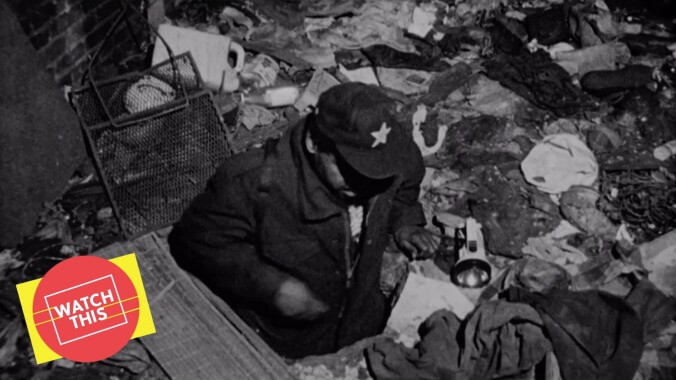A subterranean subculture comes to light in the eye-opening documentary Dark Days

Watch This offers movie recommendations inspired by new releases, premieres, current events, or occasionally just our own inscrutable whims. As part of Y2k Week here at The A.V. Club, we’ll be listing the 25 best films of the year 2000. These are some of our favorites that didn’t make the countdown.
Dark Days (2000)
The opening scene of Marc Singer’s documentary Dark Days (2000) is not for the claustrophobic. Opening with an exterior shot of New York City’s Penn Station, Singer’s hand-held 16mm camera follows a man in work boots and a canvas jacket through the station and down to an Amtrak platform hundreds of feet below the busy sidewalks of the city. The man pulls out a flashlight, and lowers himself feet first through a tiny hole in the floor of a subterranean room strewn with trash. The hole is barely big enough to fit both him and his backpack, but the man shows no signs of hesitation or fear. After all, he’s done this every single day for years.
“When I first came down to the tunnel, it looked real dangerous, because even the daytime was dark,” he says, the camera keeping pace as he walks past lean-to after lean-to made of particle board, scavenged furniture, and scraps of metal. “You’d be surprised what the human mind and the human body can adjust to,” he adds. A train rumbles by overhead. The existence of people living in the subway tunnels underneath New York City was once considered an urban legend by some, but Dark Days, which was filmed for two-and-a-half years in the mid-’90s but wasn’t released until 2000, proved definitively that not only did these people exist, but that they had managed to create lives and communities out what the rest of the city left behind.
Dark Days spends its short, 82-minute running time getting to know about half a dozen people experiencing homelessness in the tunnels, a fraction of the overall population. Many (but not all) of them are drug users, and most have experienced personal tragedies that put them on a path that eventually led them to the tunnels. All of them survive on sheer toughness and ingenuity. But Dark Days isn’t a documentary designed to make you feel sorry for its subjects, or to gawk at their unconventional living situations. Instead, Singer lets his subjects tell him about their lives on their own terms, for an extraordinarily honest look at the challenges and camaraderie of trying to live without a permanent home.

 Keep scrolling for more great stories from A.V. Club.
Keep scrolling for more great stories from A.V. Club.